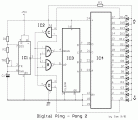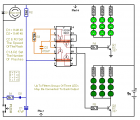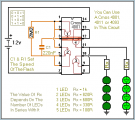FREE
circuits!
Light flasher circuit diagrams

April 29, 2010
The circuit below uses a hex Schmitt Trigger inverter (74HC14) and two 8 bit Serial-In/Parallel-Out shift registers (74HCT164 or 74HC164) to sequence 16 LEDs. The circuit can be expanded to greater lengths by cascading additional... [more]

April 29, 2010
The circuit illustrates using a 10x10 matrix to sequence up to 100 LEDs with just three ICs and 20 transistors. The two 4017 decade counters control the 10 rows and 10 columns so that one... [more]

April 28, 2010
The 555 circuit below is a flashing bicycle light powered with four C,D or AA cells (6 volts). Two sets of 20 LEDs will alternately flash at approximately 4.7 cycles per second using RC values... [more]

April 28, 2010
This 1.5 volt led fasher runs more than a year on a single 'd" cell and alternately flashes 2 LEDs at about a 1 second rate. The circuit employs a 74HC14 CMOS hex inverter that... [more]

April 23, 2010
The circuit is based on the IC1 that is 555, for the creation of alternate flashes from the two led D1-2, that can be also different colour. The frequency of alternation can be regulated from... [more]

April 14, 2010
This circuit is a double direction flash. Similar to Digital Ping- Pong 1, there is a movement of a lit dot, up and down along the LED's length. [more]

April 14, 2010
This circuit us gives the sense of movement of ball up down, after the LED turn on successively the one afterwards the other. As soon as it reaches in the one or in the other... [more]

April 11, 2010
These circuits combine a buzzer with one or more LED displays. When the push switch is operated - the buzzer will sound and the LEDs will flash. When the switch is released - the buzzer... [more]

April 11, 2010
Flashing LEDs can be used to create the impression that an alarm has been fitted. Or they can be used in conjunction with a real alarm - to warn-off a potential thief. These three small... [more]









 This category
This category